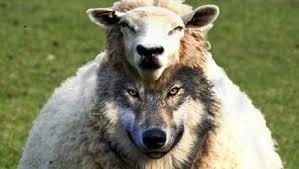Paul and the False Apostles
10:12 to 12:13

Chapters 10-13 are Paul’s emotionally charged warning to the Corinthians to set certain matters right so he wouldn’t have to do it when the apostle made his final visit to them. In these chapters the false apostles (to see link click Af – The Problem of the False Apostles) and their duped followers come more clearly into view, though Paul had made reference to them briefly in earlier parts of the letter. This is especially true of the outsiders, the false apostles, who like wolves in sheep’s clothing had infiltrated the flock. He had already briefly referred to their arrival, but he now deals with them at considerable length, pointing out their damaging influence in the church at Corinth.
In this section Paul declares, with heavy irony, that he will not dare compare himself with those who praise themselves. Because Paul is outside their circle and cannot be compared with them, their comparison of him reveals their lack of understanding. The result of his ministry among the Corinthians would speak for itself. He had founded the church and they had not. Paul hoped that as the faith of the Corinthians grew, his ministry among them would increase and overflow so that he would be able to evangelize in regions beyond them, not in another person’s field, being grateful for what the Lord had allowed him to do.
This section, while appearing to be about Paul, is indirectly about those who thought they were so spiritually superior and compared themselves to him. Only once does the apostle refer to them, and then only in an impersonal manner (10:12). It should be noted that he does not address them directly or prod them even indirectly. They were simply there, offstage, as it were, not worthy of even a minor comment. Their method of attack was to brag about themselves as polished speakers compared with him, thus seeking to undermine Paul’s position in Corinth. This forced Paul to respond to them over and over again.220
Paul had rejected self-praise and comparison as worthless. But now he asked the Corinthians to bear with a little foolishness of his own. The circumstances had driven him to that extreme. Boasting was clearly unwise; but if he ignored the slurs of his rivals the church might be persuaded that they were right all along. If he stooped down to their level, he would be a fool. Forced into a corner, Paul felt he must play the fool (12:11) and introduce his own so-called boasting. It was more than a case of fighting fire with fire. In the process, he turned his foolish boasting into a sly and devastating attack on his opponents. By repeatedly insisting that he was playing the fool by boasting (mirroring his rivals), he led the Corinthians to recognize how foolish and boastful his rivals were, and how foolish the Corinthians themselves had been for being taken in by them.
The difference between Paul and his rivals was that Paul admitted that what he did was foolish. They did not. The apostle undercut his rivals’ continual boasting with the use of irony. He didn’t boast about his glorious accomplishments, as they had, but lists a string of humiliating experiences and boldly contends that he is a better servant of Messiah because of them (11:23). The battle lines were drawn between Paul, the meek but true apostle authorized by ADONAI, and the false apostles working under the influence of Satan.221



Leave A Comment